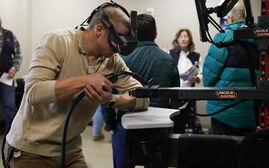Federal bill would allow younger people to train for Maine logging careers
 Courtesy / Professional Logging Contractors of Maine
Proposed federal legislation would make it easier for 16- and 17-year-olds to train in family logging businesses, something that would help ease the increasing workforce crunch in Maine's forest industry.
Courtesy / Professional Logging Contractors of Maine
Proposed federal legislation would make it easier for 16- and 17-year-olds to train in family logging businesses, something that would help ease the increasing workforce crunch in Maine's forest industry.
A federal bill that would allow owners of small logging businesses to train 16- and 17-year-old family members in Maine forest products careers is being backed by the state's congressional delegation.
The Future Logging Careers Act addresses one of the biggest issues in Maine's forest industry — the aging workforce and lack of young workers to fill the gap. Industry leaders, looking to add $3.5 billion to Maine's forest-related economy in the next five years, have said expanding or even maintaining workforce levels is the biggest challenge.
The labor shortage in the logging industry is reaching a crisis point, with an estimated 2,000 loggers and heavy-duty truckers — about a third of the industry's workforce — reaching retirement age in the next eight years, according to a recent University of Southern Maine study.
Currently, 16- and 17-year-old Mainers can't work in logging, even under parental supervision. The legislation would amend the Fair Labor Standards Act of 1938 to allow teens an opportunity to get experience in a family business in the industry, while still prohibiting use of dangerous equipment, like manual chain saws.
The Future Logging Careers Act, which also was before Congress in 2019, was reintroduced by U.S. Sen. Angus King, I-Maine, and U.S. Rep. Jared Golden, D-Maine 2nd District, last week. U.S. Sen. Susan Collins, R-Maine, and U.S. Rep. Chellie Pingree, D-Maine 1st District, are cosponsors. Delegation members, in a joint news release, noted that the industry is made up of small family-run operations, and also relies on heavy equipment that requires a year or more of training.
Dana Doran, executive director of Professional Logging Contractors of Maine, said the legislation is necessary and will ensure that the businesses can sustain themselves for the long term.
“The logging industry has a long and proud history in Maine, but it's future is uncertain without congressional action," Doran said. The state's family logging operations "hire thousands of Mainers, and contribute hundreds of millions to our state's economy."
King and Golden said that the economic impact of the law will be felt.
“Maine’s logging industry is part of the foundation of our state, passed down from generation to generation as a way to support rural Maine families and anchor the region’s economy,” King said in the release. “Many young people across our state are planning to enter this industry, and we should give them the opportunity to begin their training early in a safe, managed way."
He said the legislation would allow young people to get hands-on experience in the field alongside their parents or grandparents. "This is a bill that supports Maine families, strengthens this fundamental Maine industry, and enhances the long-term skills of Maine’s forest products workforce," he said.
While the bill looks to the future economy, Golden said it can also have an immediate impact. "Maine Maine logging operations are small family businesses who had a very tough year in 2020," he said. “If we can help them carry on these important family businesses and provide good jobs in rural Maine at the same time, that’s good policy.
"Our bipartisan bill will allow young Mainers to start their careers as loggers earlier — as long as they’re under the supervision of family members — providing logging businesses with needed labor and young Mainers with a good start for a career in the woods.”














0 Comments